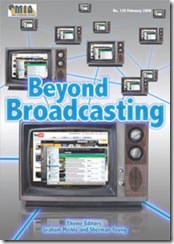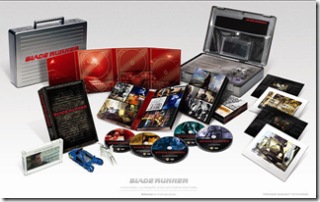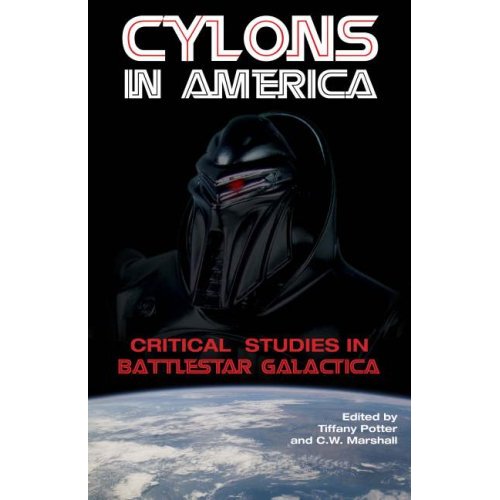Home » Battlestar Galactica (Page 3)
Category Archives: Battlestar Galactica
Beyond Broadcasting: ‘Watching Battlestar Galactica in Australia and the Tyranny of Digital Distance’
 I’m very pleased that the ‘Beyond Broadcasting’ issue of Media International Australia is out, not only because it features some excellent articles asking some great questions about the future of television in the era of digital communication, but also because it features an article of mine that I’ve been thinking about on and off for a number of years. My article, ‘Watching Battlestar Galactica in Australia and the Tyranny of Digital Distance‘ has ideas that will already be familiar to readers of this blog (and, indeed, my old blog Ponderance) as the concepts in this paper have slowly built up over time and appeared sporadically in blog form (such as here and here). When I started writing up these fragments into the final paper and posted the abstract in this blog, I was delighted that it provoked a conversation with some of my blog’s readers. A larger number of people seem to have found their way to that post after hitting NBC’s “We’re sorry, but the clip you selected isn’t available from your location” message and punching it into Google, and a few of them offered a comment on this post before heading elsewhere (quite possibly in search of a proxy so they can watch the US-hosted geo-blocked content).
I’m very pleased that the ‘Beyond Broadcasting’ issue of Media International Australia is out, not only because it features some excellent articles asking some great questions about the future of television in the era of digital communication, but also because it features an article of mine that I’ve been thinking about on and off for a number of years. My article, ‘Watching Battlestar Galactica in Australia and the Tyranny of Digital Distance‘ has ideas that will already be familiar to readers of this blog (and, indeed, my old blog Ponderance) as the concepts in this paper have slowly built up over time and appeared sporadically in blog form (such as here and here). When I started writing up these fragments into the final paper and posted the abstract in this blog, I was delighted that it provoked a conversation with some of my blog’s readers. A larger number of people seem to have found their way to that post after hitting NBC’s “We’re sorry, but the clip you selected isn’t available from your location” message and punching it into Google, and a few of them offered a comment on this post before heading elsewhere (quite possibly in search of a proxy so they can watch the US-hosted geo-blocked content).
While the article has taken a couple of years to evolve from the initial idea to this published version, the ideas still seem current. Indeed, there was an engaging debate recently in th US between the New York Times Vulture blog (and here, and here) and film and media scholar Michael Newman over the issue of newspapers and blogs posting spoilers about current TV shows when audiences are increasingly time-shifting and either watching their shows a few days later on TiVO, or a few months later on DVD. As I argue in my paper, the problem of avoiding spoilers becomes even harder for viewers in other countries, when the broadcast (or the option to download legally) is often delayed by a number of months – an issue indicative of what I’ve called the tyranny of digital distance.
I’m also pleased that the editors of this themed issue, and the general editor of Media International Australia were kind enough to give me permission to put up a post-print of my article here. (A post-print, for those interested, is the final version of the article submitted to the journal after the peer review process and final changes to the article have been made, but before the article is page-made and the layout done for the journal itself.) So, if you fancy reading the whole paper and you don’t have access to Media International Australia through your library, you can still read the full paper here.
If you can get hold of the journal, there are a number of other papers which are a great read. One of these, Axel Bruns’ ‘Reconfiguring Television for a Networked, Produsage Context’ can be accessed over at his blog.
As always, any comments or thoughts on my paper or the issues it touches on are most welcome!
Make A Cylon?!?

First thought: if we’ve learnt anything at all from Battlestar Galactica, shouldn’t we know better than to make a Cylon? (Intelligent machines evolving and rising up against their human oppressors and so on…)
That said, when MAKE, DVICE and the SciFi Channel team up and recruit Cylon actors Tricia Helfer (Number Six) and Grace Park (Boomer) to judge a competition in which entrants must physically construct (not just photoshop) a Cylon, I’m intrigued to see what emerges! Let’s just hope the entries aren’t too realistic. Details here.
The WGA Strike: Making Writers Visible (starring Ron Moore with a special guest appearance by Daily Show writers)
 The WGA Writer’s Strike is now in its third week, so I thought I should finally get around to blogging a few thoughts. First off, I have to say, it’s fantastic to see the issue of online content finally being taken seriously – as more and more material hits the web, I completely agree that writers should be getting their (usually very small) cut. I find the claims by the media conglomerates that the web offers no solid business model disingenuous – and, as many writers have argued, a small percentage of nothing is still nothing: residuals only get paid if money gets made.
The WGA Writer’s Strike is now in its third week, so I thought I should finally get around to blogging a few thoughts. First off, I have to say, it’s fantastic to see the issue of online content finally being taken seriously – as more and more material hits the web, I completely agree that writers should be getting their (usually very small) cut. I find the claims by the media conglomerates that the web offers no solid business model disingenuous – and, as many writers have argued, a small percentage of nothing is still nothing: residuals only get paid if money gets made.
Also, for me the Writer’s Strike coincided with my final revisions on my Tyranny of Digital Distance paper which looks at the way online content and networked communication change the expectations and possibilities of media (especially television) distribution. The series that formed my case study was Battlestar Galactica (BSG) and so I was intrigued to see show-runner Ron Moore talking about BSG’s first webisodes (The Resistance from 2006) in relation to the strike. He noted that despite being put together by the same crew and cast as the regular episodes, the studio didn’t want to pay for this ‘promotional’ content, which wouldn’t involve paying anyone; Moore held out and got people paid, after some industrial action, but the studios still wanted to run the webisodes without credits and eventually did. From this, Moore came to one conclusion:
“If there’s not an agreement with the studios about the internet, that specifically says ‘This is covered material, you have to pay us a formula – whatever that formula turns out to be – for use of the material and how it’s all done,’ the studios will simply rape and pillage.”
One of the stumbling blocks in getting the studios to agree to share the profit from online content is the fact that writers are simply not the most visible people in the whole world, and thus lack bargaining power. Actors are, and film directors, but writers are rarely well known and that’s one of the things the strike has changed somewhat. Or rather, an increased visibility of writers is one of those things that happened leading up to the strike, in some corners, at least, and has worked in favour of the writers’ cause. Ron Moore, I think, is a great case study here: sure, he’s the show-runner for BSG as much as a writer, but across the last few years Moore has amplified the voice of the writer to BSG‘s fans and beyond. The episodic BSG commentary podcasts have occasionally featured actors from the show, but the podcasts have most frequently focused on discussions of the writing process and have even featured additional raw recordings of writers’ meetings. The fact that the podcasts are released synchronously with the episodes means that fans have often linked the writers perspectives with the show as much as the actors and CGI that make the visual experience. If nothing else, I would argue, Moore helped fans ‘hear’ the writers in an explicit way which highlighted the ongoing creative role of the writing team. Indeed, if Joss Whedon had been podcasting during the filming of Buffy, he’d probably have filled this role, and his DVD commentaries certainly talk about the writers and the process of writing, but the immediacy of Moore’s podcast are, I think, key to their success.
Ron Moore has also maintained a blog and, like the podcasts, this was hosted by SciFi.com and centrally branded. However, one of notable things about the strike has been that Moore wanted to blog outside of the corporate umbrella and has thus started writing at his own domain. On his second post he noted that when the much-anticipated Battlestar Galactica: Razor airs next week, the podcast commentary will be a little different: it’s a recordings of the writers’ room when the Razor story was broken. Again, the writers are in the spotlight. Now, wearing both his writer and show-runner hats, Moore has blogged about BSG’s uncertain future, a post sure to have the full sympathy of (albeit anxious) fans:
Production wrapped on episode 413 late last night, and there’s no certain date to resume shooting. No more scripts exist. My office staff has been laid off. My cast has been suspended, without pay.
I refuse to believe that we won’t finish, that we won’t be back to film our final stories, but I know and accept there is that possibility. The strike will be a seminal event for many of us in this business as it’s put literally everything we care about in the balance (if only for a short time so far) for something we all believe is important.
Writers talk a lot about the strike, about the reasons we’re out on the picket lines and our feelings and experiences in the business. It’s been an interesting three weeks. I’ve connected with more scribes in the last few weeks than in many months before and I come away from it to date with a sense of optimism about the solidarity of the membership and admiration for my peers.
Galactica’s coming back, I frakking promise you that. But I am ready to put the rest of the story on the table and take the risk that I’ll never be able to tell it, in support of this strike.
Like Adama says, you make your choices and then you live with them.
Still.
A helluva gamble.
It’s a gamble that fans might have been unprepared to accept in the past, but with the visibility of writers thanks to Moore, and thanks to the strike, it’s a gamble which fans will likely support. That said, I think the writer’s have probably gotten all of the sympathy that viewers are likely to give – things will get harder as the episodes already in the can run out and shows stop abruptly mid-season. Lets just hope that as talks between the WGA and the studios resume next week, a reasonable outcome can be reached.
Until then, for an accessible and convincing explanation of the WGA’s position, watch this ‘Why We Fight’ clip. However, if you prefer your news just a little funnier, then this clip from Daily Show writer Jason Rothman (with a characteristically odd cameo from John Oliver) in the style we’ve come to love, is for you:
Incidentally, I think this clip is brilliant, because Rothman does such a good job of showing how much of The Daily Show comes directly from the writers’ pens.
Visit United Hollywood for more, or to show support click on Fans4Writers.
It’s Going to be a BIG September!
I’m attending four conferences or symposia across the next four weeks. In a perfect world, each will come with details blogging; however, if I don’t get around to writing much for a few weeks, here’s why …
[X] Learning Futures Symposium – 10 & 11 September, Canberra – This is a two-day symposium held at ANU looking at the changing shape of education, pedagogy and learning in general in the face of changes brought on by digital communication under the web2.0 umbrella. The programme (pdf) looks pretty interesting, with showcases of Australian social software educational efforts and some great sessions which are more centred around conversations than too many formal presentations.
[X] Thinking Society, Thinking Culture – 13 & 14 September, Perth – This is an interdisciplinary forum organised by the Institute for Advanced Studies at UWA with the aim of bringing WA’s many academics, researchers, artists across the range of historical and cultural studies, and other social sciences, together the share their work and build fruitful interdisciplinary networks and exchanges. I’m giving my paper “‘We’re sorry, but the clip you selected isn’t available from your location’: Watching Battlestar Galactica in Australia and the Tyranny of Digital Distance” in ‘A Digital World’ session which takes place on Friday, 14 September starting at 10.30; this panel will also feature Toby Burrows talking about ‘e-Research and the Humanities: Current Directions’, Ethan Blue talking about ‘Prison Medical Photography in Early 20th-Century California’ and Jeremy Blank speaking on ‘Past,Present,Futures:Integrating practice in Visual Art studies’.
The keynote is being delivered on Thursday (13th) evening by Ross Gibson from UTS talking on “The Aesthetics of Repletion“; this talk is open to the public, so if you’re in Perth, come along!
[X] PerthDAC – Digital Arts & Culture – 15 to 18 September, Also Perth – DAC has a history of being at the cutting edge of digital arts and media studies and this year looks to be no exception. There’s lots to look forward to, from talks on blogs in education to Axel Bruns on produsage to a host of key names in game studies talking about everything from Second Life to the Wii. DAC is concurrent with BEAP (the Biennale of Electronic Arts Perth) so the theory of DAC will mix with the performance and exhibitions of the latest in digital art which will no doubt be a very rich and exciting four days!
[X] The Australian Blogging Conference – 28 September, Brisbane (Free!)- Sessions will include The Politics of Blogging; Researching Blogging; Blogs, Creativity and Creative Commons; Legal Issues; Citizen Journalism, Blogs and Education; Business and Corporate Blogging; and Building a Better Blog. I’ll be facilitating part of the Blogs and Education session, although I’m not sure how many people will be there since I suspect the concurrent Citizen Journalism session, which includes a focus on YouDecide2007, might prove quite a draw-card. That said, Blogging in Education is certainly fun to talk about and there’s a lot going on in the world of edublogging, so I trust we’ll have some great exchanges in our session, too! To see who’s already confirmed they’re attending, click here; that list will grow substantially across the next few weeks, I suspect!
I’m also chuffed it’s September because that means Jill Walker Rettberg will be joining us at UWA for the month! And let’s not forget that October will also include Australia’s first Podcamp which will also be held in Perth!
Blade Runner: The Final Cut
The US release date for the much anticipated Blade Runner: The Final Cut DVD has been set at 18 December 2007 (I hope the same date will be true for Australia, but I can’t find anything to confirm that yet). There are sets from 2 to 5 discs in size, including the package pictured, which comes in briefcase in the style of one holding the the Voight-Kampff test in the film. It all looks very exciting, and, unlike, say, George Lucas’ Star Wars Special Editions, the Blade Runner sets will contain all the versions of the film, from the 1982 release, the first Director’s Cut, the new Final Cut and, for those getting the 5-disc pack, a work-print (which I’ve never seen) which has all sorts of changes that never made it to any cinema screens at any time.
One of the best parts of this collection will have to be the new ‘Dangerous Days’ documentary which seeks to be a ‘definitive’ look at the film, but really will just add more to the film’s ongoing mythology. Yahoo! has a few preview clips up, which include footage showing new interviews with most of the cast and crew, including James Edward Olmos and Harrison Ford. I thought the previous Blade Runner documentary put together by Mark Kermode was pretty good, so I’m hoping to be dazzled by ‘Dangerous Days’ if it has even more to show about the film and its cultural impact.
I’m quite pleased this set is on its way – when I was lecturing earlier this year on Blade Runner I was really starting to think it would be the last time this film would seem relevant to students, but I think this re-release will spark further interest in the film, its peppered production history and the importance of the questions it provokes. Yes, I think Deckard is a replicant in every cut, but I’d be pleased to hear why you disagree … or agree! 🙂 [Via AICN]
For Harrison Ford fans, you can also check out the Comicon report from Ford, Spielberg and others from the set of Indiana Jones 4!
Update: Blade Runner: The Final Cut will get a cinematic premiere on September 1st at the 64th Venice Film Festival!
Cylons in America: Critical Studies of Battlestar Galactica
Since I’ve just signed off on editors’ proofs for my chapter in the forthcoming Cylons in America edited collection, I thought I’d paste this little advertisement from Continuum’s 2007 Pop Culture catalogue to remind myself (and anyone else interested) that it should, in fact, be out before the end of the year …
[Click image to enlarge.]
This is my first book chapter (as opposed to a journal article, of which there are a few) and I’m quite excited to see the collection in print in the near future!
Update (15 Sept 07): The publication date for this collection has now been confirmed as January 31 2008 (for the US) and Cylons in America: Critical Studies of Battlestar Galactica is available for pre-order from Amazon
.
Update 2 (26 November 07): It looks like the US version will now get a December 10th release! Check out the cover:
Update 3 (7 Dec 07): As a few people have asked about this book, I thought I’d add the Table of Contents to this post, so you can get a sense of what’s under the cover:
“I see the patterns”: Battlestar Galactica and the Things That Matter – C. W. Marshall and Tiffany Potter
I. Life in the Fleet, American Life
- (Re)Framing Fear: Equipment for Living in a Post-9/11 World” – Brian L. Ott
- Torture, Terrorism, and Other Aspects of Human Nature – Erika Johnson-Lewis
- Alienation and the Limits of the Utopian Impulse – Carl Silvio and Elizabeth Johnston
- The Cain Mutiny: Reflecting the Faces of Military Leadership in a Time of Fear – Rikk Mulligan
- Mad, Bad and Dangerous to Know? Negotiating Stereotypes of Science – Lorna Jowett
- “Pyramid, Boxing, and Sex” – Kevin Wetmore
II. Cylon/Human Interface
- The Cylons, the Singularity, and God – C.W. Marshall and Matthew Wheeland
- Sharon’s Choice: The Role of Decision in the Self-Constitution of Personhood – Robert Moore
- Uncanny Cylons: Resurrection and Bodies of Horror – Alison Peirse
- “Humanity’s Children”: Constructing and Confronting the Cylons – Tama Leaver
- Hybridity’s End – Matthew Gumpert
- Erasing Difference: The Cylons as Racial Other – Christopher Deis
III. Form and Context in 21st-Century Television
- When Balance Goes Bad: How Battlestar Galactica Says Nothing” – Chris Dzialo
- “This Might be Hard for You to Watch”: Salvage Humanity in “Final Cut” – Kevin McNeilly
- “Long Live Stardoe!”: Can a Female Starbuck Survive? – Carla Kungl
- Authorized Resistance: Is Fan Production Frakked? – Suzanne Scott
- Of Duduks and Dylan: Negotiating the Aural Space – Eftychia Papanikolaou
- “All this has happened before”: Repetition, Re-imagination, and Eternal Return – Jim Casey



